778 truck campers responded to our Fuel Generator vs Lithium System Poll and there are going to be some serious meetings at truck camper companies coast-to-coast. Generator or not, here are the results!
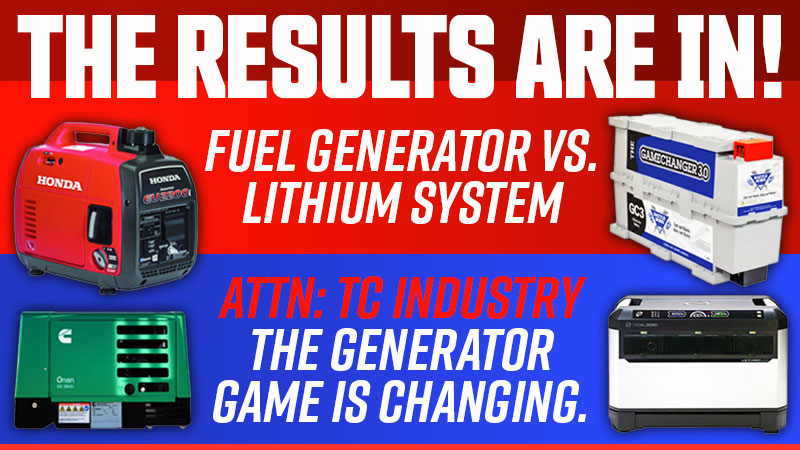
This past July we conducted the 2024 Big Battery Poll and discovered a strong preference for lithium batteries (57.9 percent) versus AGM (8.0 percent), and lead acid (2.4 percent). We also learned that truck campers want big battery banks: 400 Ah (26.3 percent), 600 Ah (13. percent), and even 1,000 Ah or more (14.7 percent).
All of this left us wondering—what about fuel generators versus the more advanced solar-lithium-inverter systems? If truck campers want big lithium battery systems and inverters, are fuel generators still relevant?
The short answer is yes. Even with the advances in solar-lithium-inverter systems, there are applications and environments where a fuel generator is superior. For example, a fuel generator can reliably run an air conditioner all day, day after day after day, as long as you keep adding fuel. Solar-lithium-inverter systems are not there yet. Furthermore, solar-lithium-inverter systems do not operate well in extreme cold, or the overcast, short-day winter weather in which that extreme cold occurs.
That stated, most truck campers camp in fair weather. Most truck campers also try to avoid the extreme heat and extreme cold. Does this mean fuel generators are on their way out and solar-lithium-inverter systems are the future? There’s only one way to find out.
Get ready to flip your 110 switch! Here are the Fuel Generator vs Lithium Poll results:
1. Do you currently have a built-in or portable generator?
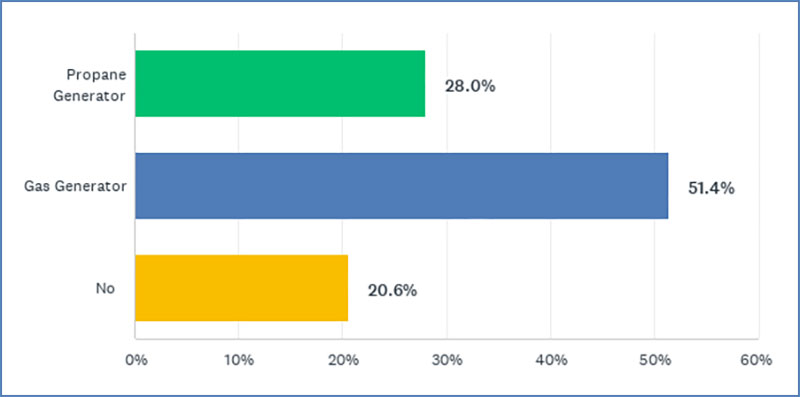
Right off the bat, it was interesting to see that over half the respondents carry a portable gas generator. It was equally interesting to see that over 20 percent did not have a fuel generator at all.
That left built-in generators at 28 percent. To be fair, there are only so many truck campers that offer built-in generators as an option. That list is mostly hard sides of the full-size and fully self-contained variety. Within this group, built-in generators likely remain a favored option.
On the other hand, the past decade has introduced increasingly efficient air conditioners, and increasingly capable lithium batteries and systems. That means a portable gas generator—like a Honda EU2200i—may be all these setups need.
We fall into the 20.6 percent ‘do not have a fuel generator’ camp, but have long wrestled with the temptation to carry a portable gas generator. The versatility of a portable gas generator means you can bring the generator with you, or leave it home. You can also use the portable generator at home, or anywhere else.
Alas, we have never found enough need to purchase a fuel generator and add its weight and fuel weight to our rig. Instead, we have focused on increasing our solar panel and lithium battery system. For now, that’s been the right decision for us and the type of camping we do.
2. If you have a built-in or portable generator, what do you use it for?
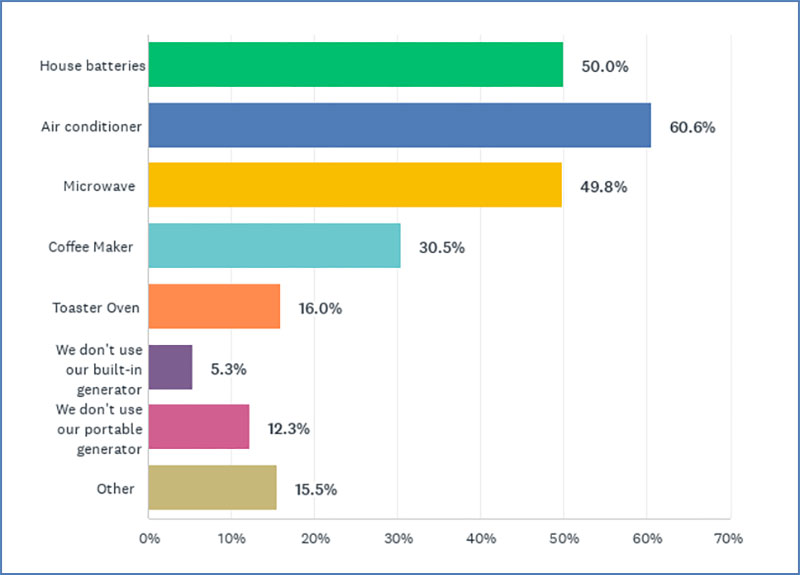
Just as we expected, running the air conditioner, charging the house batteries, and running the microwave are the number one, two, and three reasons people have a generator. No revelations there.
What is interesting are the 5.3 percent who have a built-in generator, but don’t use it and the 12.3 percent who have a portable generator but don’t use it. That’s 17.6 percent of respondents who don’t use their generators.
Hopefully, the portable generator folks who don’t use their generators leave their generators at home. As for the built-in generator folks who don’t use them, you can always remove the generator and sell it. Save the weight and put some next-camping-trip bucks in your pocket!
Of the other generator uses, one answer stood out: emergencies. This single-word answer is the best argument possible for having a fuel generator on hand. Again, a portable gas generator is probably the best answer for emergencies as it can be used in the camper, at home, and everywhere else.
3. If you have a built-in or portable generator, how often do you use it?
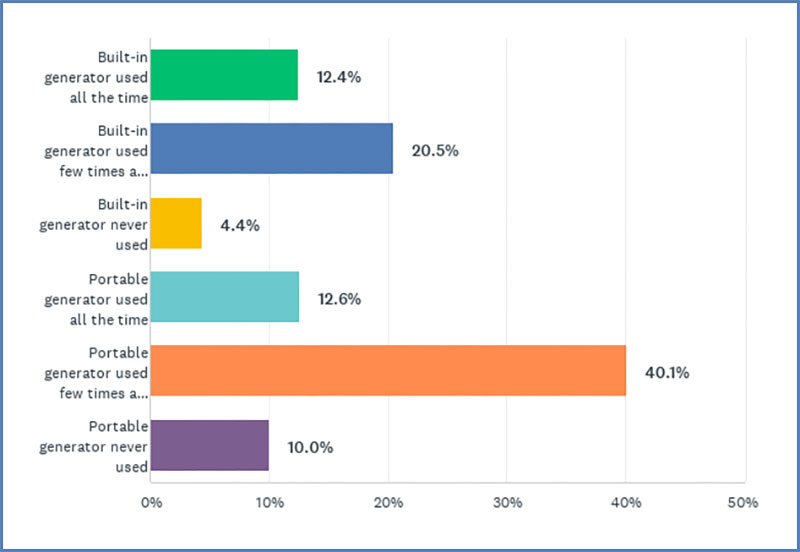
I have long suspected that the majority of fuel generators go unused most of the time. I can’t tell you how many times I’ve talked to folks who said they only ran their built-in generators to exercise it now and then. More recently I’ve heard from readers who said they never used their generators at all. Of course, I also know readers who use their fuel generators every day to make coffee, run a hair dryer, and toast their morning muffins.
Well, I wasn’t exactly wrong. The number one and number two answers were, “I have a portable generator and use it a few times a year” (40.1 percent), and “I have a built-in generator and use it a few times a year” (20.4 percent).
That’s 60.5 percent of respondents who have a built-in or portable generator but only use it a few times a year. Add to that the 10 percent who never use their portable generator, and 4.4 percent who never use their built-in generator. That’s almost 75 percent of respondents only use their fuel generators a few times a year, or never use their generators. Wow!
In contrast, 25 percent of respondents have a built-in or portable generator and, “use it all the time”. Interestingly enough, these numbers were split evenly between the two generator types.
What does this mean? It means think carefully before optioning or buying a fuel generator. Fuel generators are expensive, heavy, and take up a lot of space for something you may not use, or use often.
Based on the survey responses, there’s a high likelihood that you will either never need a fuel generator, or only need it a few times a year. We would only ‘need’ a generator a few times a year, and just get by without it, or find a campground or moochdocking opportunity when that happens.
4. If cost was not an object, would you REPLACE your built-in or portable generator with a similarly capable solar panel, lithium battery, and inverter system?
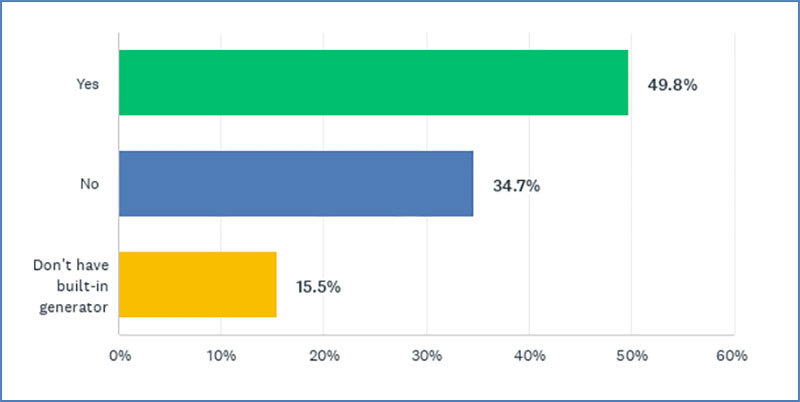
There’s an assumption within the truck camper marketplace that fuel generators are out of favor, and solar-lithium-inverter systems are the future. This question was designed to put that assumption to the test.
49.9 percent of respondents said they would replace their fuel generators with a solar-lithium-inverter system. Subtracting out the 15.5 percent who don’t have a fuel generator, the percent of respondents who would replace their fuel generator with a solar-lithium-inverter system is actually 59.1 percent. This shows the powerful trend towards solar-lithium-inverter systems.
Still, 34.5 percent would not replace their fuel generator. The key follow-up question would be why? I suspect their concerns include using lithium systems in cold weather and relying on solar in cloud-covered conditions.
5. If cost was not an object, would you ADD a solar-lithium-inverter system to your built-in or portable generator?
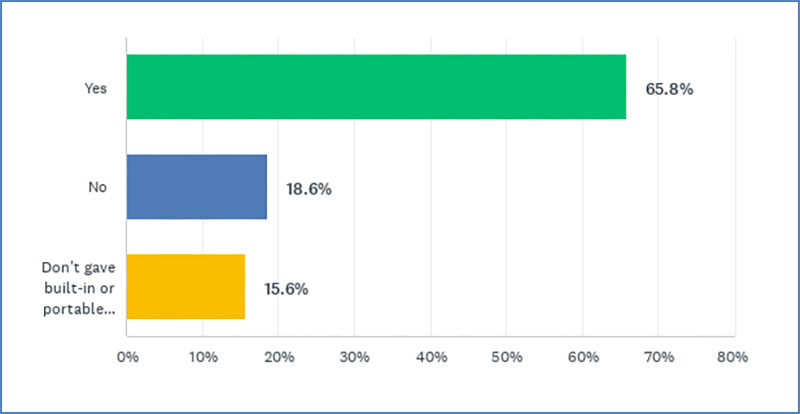
Now here’s where things get interesting. Where question four asked folks to give up their fuel generator for a solar-lithium-inverter system, this one asked about adding a solar-lithium-inverter system to their campers.
65.8 percent said yes. Removing the 15.7 percent who don’t have a generator to add a solar-lithium-inverter system to, the number jumps to 78 percent.
Let there be no doubt that truck campers are interested in solar-lithium-inverter systems. They may not want to remove their fuel generators just yet, but they sure want a solar-lithium-inverter system.
6. If you were to purchase a truck camper today, which of the following options would you choose?
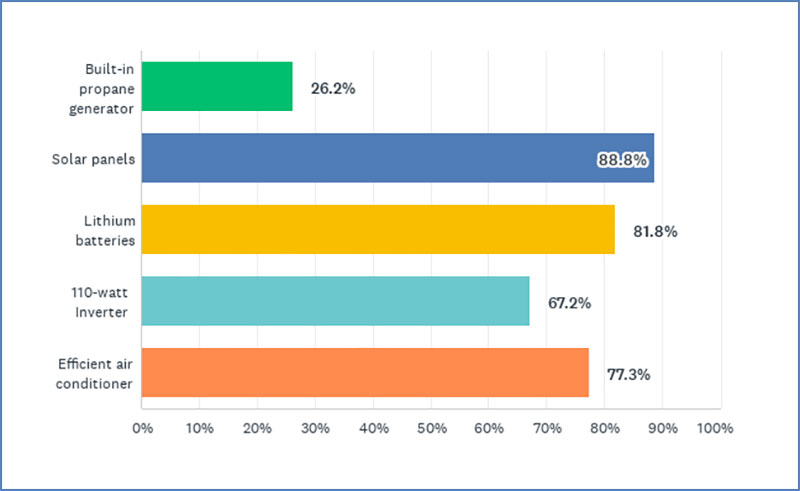
This question further proves the overwhelming desire for solar panels (88.8 percent), lithium batteries (81.7 percent), and 110-voltinverters (67.2 percent).
Interestingly, interest in efficient air conditioners is right up there at 77.3 percent. Any company that’s installing old-school high draw air conditioners needs to give that serious consideration.
The 26.1 percent of respondents who would opt for a built-in generator is remarkably close to the 27.9 percent of respondents who stated they had a built-in generator in question one.
Even after learning that many of these built-in generators get minimal to no use, could it be that these readers just like having a built-in fuel generator? Or does this number reflect folks who don’t have built-in generators but would prefer to have one? Clearly, we needed an additional question here.
7. If you had to choose between a $5,000 built-in propane generator and a similarly capable $15,000 solar-lithium-inverter system, which would you choose?
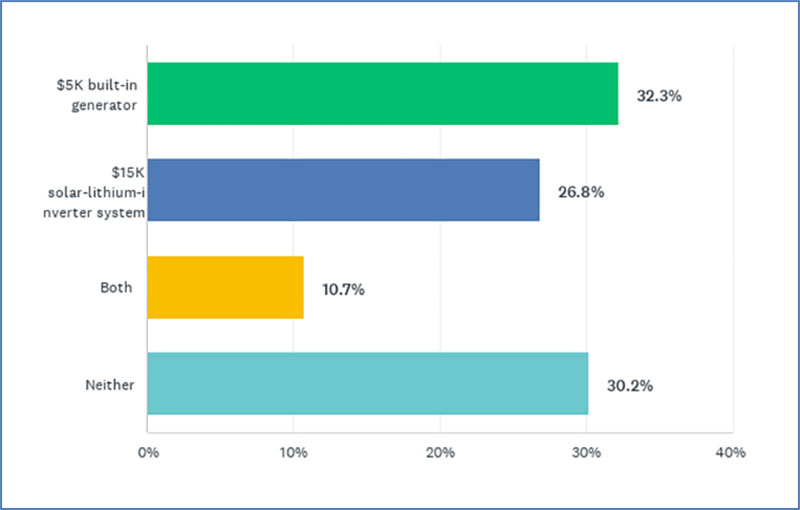
We got some emails about the costs stated in this question. Yes, the most popular built-in propane generator is at least a $5,000 option. And yes, a comparably capable solar-lithium-inverter system option (at least 800 watts or solar, 800 Ah of lithium, and a 2,000-watt or better inverter) is still around $15,000 (all USD) including the cost of installation. And yes, you could put together a similarly capable solar-lithium-inverter system yourself and install it for less.
The point of this question was to highlight the cost difference and put the emerging solar-lithium-inverter system preference to the test.
In a nutshell, the responses were fairly evenly split between the $5,000 built-in propane generator (32.2 percent), neither one (30.1 percent), and the $15,000 solar-lithium-inverter system (26.9 percent). The last 10.7 percent would spend $20K on all of the above.
The fact that 30.1 percent said “neither” probably includes the 20.6 percent from question one that said they don’t have a generator now, and some of the 17.6 percent who stated they had a fuel generator, but never use it.
8. If the cost of the above two systems were the same, which would you choose?
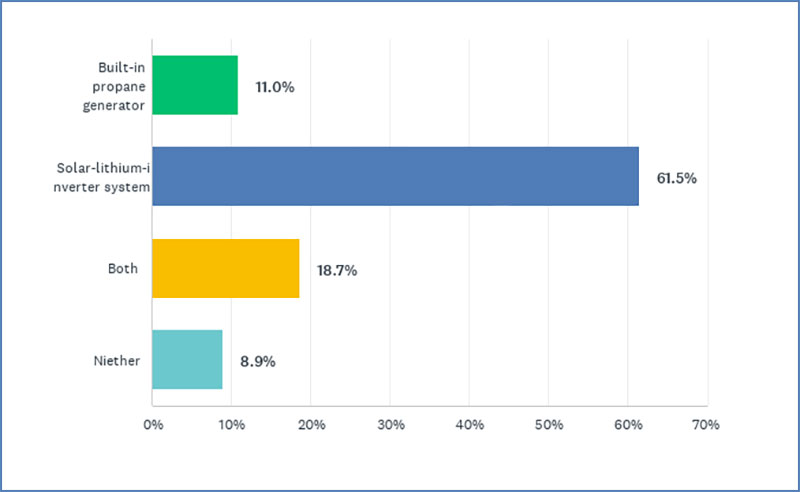
The big picture from this answer is money still matters. The cost of solar-lithium-inverter systems needs to come way down to be truly viable. If and when that happens, the demand will be off the charts. From the above chart alone, approximately 80.2 percent would choose a solar-lithium-inverter system or a solar-lithium-inverter system and a fuel generator.
Beyond that majority, 10.9 percent would still prefer a built-in propane generator, and 8.9 percent would want neither one. Put another way, if and when solar-lithium-inverter systems come down in price, fuel generators will be a tough sell.
Five Important Industry Take Aways
1. As the Big Battery Poll results showed, lithium batteries are what the truck camper marketplace wants. Again, I will state for the record that most truck campers will be perfectly happy with two Group 27 or Group 31 AGMs, but that’s not where the consumer demand is. Going into 2025, lithium is the preferred standard.
2. Offer an advanced solar-lithium-inverter system as a factory option. This could be a complex system of solar panels, lithium batteries, and an inverter, or an all-in-one system like the Goal Zero Escape System. What matters is that the truck camper community is keenly interested in having such a system on the options menu.
3. Find ways to bring the cost of solar-lithium-inverter systems down. The demand for these systems is very high, but the price remains too steep for most camper customers.
4. Prioritize efficiency with your air conditioner selections. Ten years ago, manufacturers made sure their air conditioners could run on a Honda EU2000i. That mindset needs to return and push for even greater efficiency.
5. Keep fuel generators on the option menu knowing they’ll increasingly be a niche product. Some truck campers will insist on them for the foreseeable future, but many will steer towards the advancing advantages and capabilities of solar-lithium-inverter systems.
